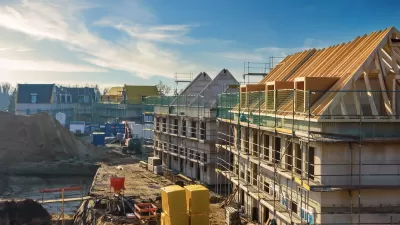In the early part of the 20th century, Europe looked toward the U.S. to learn how to adapt cities to car travel, as difficult as that may seem. It wasn't until the 1990s, in the presence of sprawl and failing public transit that the pattern reversed.
If anyone is qualified to compare transportation and land use in the U.S. and Europe, it is Ralph Buehler, PhD, associate professor in urban affairs and planning and a faculty fellow with the Metropolitan Institute at Virginia Tech’s Alexandria Center. "Most of his research has an international comparative perspective, contrasting transport and land-use policies, transport systems, and travel behavior in Western Europe and North America," according to his bio.
In this piece, he puts forward nine reasons why Americans drive everywhere, or so it seems. Just look at short trips under one mile: "Americans drove almost 70 percent of the time, while Europeans made 70 percent of their short trips by bicycle, foot, or public transportation," he notes.
Who do we blame? Transportation planners and engineers, for one. Under reason #2:
Road standards. As a result of early mass motorization, American cities were first to adapt to the car at a large scale. U.S. planners and engineers developed initial standards for roadways, bridges, tunnels, intersections, traffic signals, freeways, and car parking. Successful innovations quickly spread elsewhere, often in the form of standards. Europeans also experimented with automobile infrastructure—Stockholm opened a large inner city clover-leaf interchange in the 1930s—but European cities adapted to cars much more slowly than U.S. metros did, especially before World War II.
The one reason that may jump to mind first for many - I know it did for me, was gas prices. That was #3:
Vehicle taxes. Taxation of car ownership and use has traditionally been higher in Europe and helped curb car travel demand. Today a gallon of gasoline is more than twice as expensive in Europe than in the United States. Moreover, in Europe gas tax revenue typically contributes to the general fund, meaning roadway expenditures compete with other government expenditures. In many U.S. states and at the federal level, large parts of the gas tax revenue are earmarked for roadway construction, assuring a steady flow of non-competitive funds for roads.
Okay, you'll have to read his piece to see the other seven reasons. One last description of the author. Dr. Buehler is also co-editor of City Cycling (MIT Press, 2012) and based in Old Town Alexandria, Virginia.
FULL STORY: 9 Reasons the U.S. Ended Up So Much More Car-Dependent Than Europe

Alabama: Trump Terminates Settlements for Black Communities Harmed By Raw Sewage
Trump deemed the landmark civil rights agreement “illegal DEI and environmental justice policy.”

Study: Maui’s Plan to Convert Vacation Rentals to Long-Term Housing Could Cause Nearly $1 Billion Economic Loss
The plan would reduce visitor accommodation by 25% resulting in 1,900 jobs lost.

Planetizen Federal Action Tracker
A weekly monitor of how Trump’s orders and actions are impacting planners and planning in America.

Wind Energy on the Rise Despite Federal Policy Reversal
The Trump administration is revoking federal support for renewable energy, but demand for new projects continues unabated.

Passengers Flock to Caltrain After Electrification
The new electric trains are running faster and more reliably, leading to strong ridership growth on the Bay Area rail system.

Texas Churches Rally Behind ‘Yes in God’s Back Yard’ Legislation
Religious leaders want the state to reduce zoning regulations to streamline leasing church-owned land to housing developers.
Urban Design for Planners 1: Software Tools
This six-course series explores essential urban design concepts using open source software and equips planners with the tools they need to participate fully in the urban design process.
Planning for Universal Design
Learn the tools for implementing Universal Design in planning regulations.
Caltrans
Smith Gee Studio
Institute for Housing and Urban Development Studies (IHS)
City of Grandview
Harvard GSD Executive Education
Toledo-Lucas County Plan Commissions
Salt Lake City
NYU Wagner Graduate School of Public Service




























